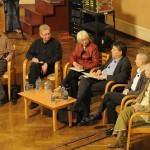Bearing fruit in every good work
By the time this post is published, I should be in the “sanctuary” of a local megachurch talking with people who have come to a food pantry that they host every other week. Some other friends should be in there with me this week. More friends will be carrying bags of groceries to the people’s cars and trucks.
We’re not “members” of this megachurch, but we’re all working together to serve some people in our community who are hurting and in need.
Since I’ve been studying through Colossians, I’ve been captivated by Paul’s prayers for them. For the past two weeks, I’ve been praying (along with Paul) for my brothers and sisters who will be serving others at the food pantry:
…That you may be filled with the knowledge of his will in all spiritual wisdom and understanding, so as to walk in a manner worthy of the Lord, fully pleasing to him, bearing fruit in every good work and increasing in the knowledge of God. (Colossians 1:9-10)
I’ve also been praying that God would give us opportunities to share the good news of Jesus Christ and his kingdom with these hurting people as we serve them and listen to them and pray with them.
Would you join me in praying for us?
The connection between worship and service
It is possible to go through motions that are called “worship” (singing, praying, preaching, professing, etc.) without actually worshiping God. It is possible to think you are worshiping God without actually worshiping God.
It is possible to do things for others that are not actually serving in Jesus’ name. It is possible to feed, clothe, care, and heal without doing so in the power that God provides and without giving honor and glory to God through Jesus Christ.
However, it is impossible to actually worship God without serving others. The two go hand in hand.
The Israelites did not understand this connection. So they dutifully carried out the rules and regulations of the sacrificial system while ignoring the needs of the people around them. God did not consider this worship, even though the Israelites thought they were worshiping because they were doing the right things.
In fact, on some occasions, God told them to stop offering sacrifices and stop observing the feasts (that he instituted) until they first learned to care for those around them. (See Isaiah 1:11-17 for one example.)
Similarly, in the NT, we see examples of Christians carrying out the “practices” as they should, but the practices were worthless because they were not caring for the people around them. (See 1 Corinthians 11:17-34 for one example.)
As James wrote, any kind of faith does not include helping a brother or sister who is in need (actually helping by doing something to alleviate that need) is in reality dead faith. John wrote that someone who do not love (in action, not just words) his brother or sister does not love God. These are strong words. We should consider them very carefully.
Also, consider the famous “love chapter” in 1 Corinthians 13. Paul begins by saying that all of our offerings of spiritual gifts (prophesy, tongues, giving, faith,… and you could include any gift here) are nothing if they are not exercised with love. Now, look at his description of love in 1 Corinthians 13:4-7. Everything in that list is related to how we treat other people!
We can close our eyes while we sing. We can rise early in the morning to pray or pray seven times per day. We can listen to sermons all week long. We can teach Sunday school or even preach sermons. We can put vast sums of money into the collection plate or give to support missions. But, if we are not caring for and serving and helping the hurt and lost and needy around us, then we should not call these things “worship.”
Is it all just talk?
Sometimes, when I write blog posts or comment on other blog posts or even respond to comments on my posts, it seems like it’s all just talk. I wonder, “Are we all just talking to each other, or are the posts and comments actually helping people change?”
Last week, Keith at “subversive1” published his posts called “How to Start a Ministry to the Poor in your Community.” I linked to his articles in my post “Jesus will lead you to ‘the least.’” (Several other people linked to Keith’s articles too.)
In response to the comments on my article, Dan at “The Ekklesia in Southern Maine” wrote a post called “A Conversation on Reaching Out.”
So far, it’s still all just talk. That is, it’s all just talk until you read the comments on Dan’s post. This is what Jeremy and Dan write:
Jeremy:
By the way…based on what both Alan and Keith said, I think I may have already found a place to get involved with. It’s a ministry for the children of migrant workers. We are very excited about it, and hope it works out.
Dan:
Based on that conversation and some stuff I had been thinking about we are going to get involved by providing people with heating oil. That is a major difficulty for families this far north, especially considering it costs over $3 a gallon right now.
I figure that is a good way to apply those principles to our situation, living in the woods in Maine.
This is awesome! It’s not just talk when we actually change what we’re doing!
And, to all of this, I say: To God be the glory! And, I thank him for the opportunities that he’s given me, Keith, Jeremy, Dan, and others to serve people in the name of Jesus. I pray that he continues to give us opportunities and strength and a desire to serve him by serving others, and that he uses our efforts to produce fruit and build his kingdom!
Jesus will lead you to “the least”
So, here’s the deal. If you’re following Jesus, he will lead you to “the least.” (If you don’t know who “the least” are, then please read Matthew 25:31-45.)
Where Jesus certainly answers a few theological type questions, I don’t see examples of him sitting around for house discussing the minute details of a specific theological issue. (Perhaps that’s only because he couldn’t get enough people to come to his conference?)
Anyway, I know that everyone and their sister is linking to these posts written by Keith from “subversive1,” but I want to link to them too, in case you haven’t seen them:
How to Start a Ministry to the Poor in your Community: Part 1, Part 2, Part 3, Part 4, and Part 5.
Perhaps you are already serving the poor, the hungry, the thirsty, the unemployed, the elderly, the orphans, etc. in your community. Great! Please write about it so that others can follow your example. (Many Christians have NEVER seen an example of other Christians serving “the least.”) However, if you are not serving others, then why not follow some of Keith’s suggestions?
By the way, you may disagree with the way that Keith is serving, or you may disagree with the way that I’m serving, but if you are not serving “the least,” then our ways are much, much better than your way. So, if you want to disagree, do so with a lifestyle of service and not just your words.
Plant a church in his projects?
Yesterday (I think), I heard about a group in Orange County, CA who are planning to start churches among the homeless.
That sounds very exciting to me… go where the need is. Take the church to the people.
Then, today, a friend reminded me of this song by LeCrae called “Beautiful Feet.” Here are part of the lyrics:
Eric used to go to bible study as a kid/ he got older and started doing what the hood did/ a rival gang caught him slippin tried to take his life/ but then the gun jammed up so them beat him nice/ he woke up in the hospital singing bible songs/ praise God he had a place to learn the bible from/ but then he gets saved and wanna preach Christ they make him change his whole culture and whole way of life/ he gotta get him a bachelors wear a suit and tie/ go to seminary/ by then all of his boys will die/ Jesus came to invade culture outta Nazareth and used a couple fisherman who people saw as hazardous/ the feet are beautiful if only they’d go/ if ain’t nobody in hood preaching how will they know?/ Eric is better used taught trues in his context/ somebody please plant a church in his projects.
I think LeCrae and these brothers and sisters in Orange County have a pretty good missiology. What do you think?
Gathering suggests dispersal
Three years ago, I wrote a post called “Gathering suggests dispersal.” In this post (as well as a few others that I’ve written through the years) I’m connecting gathering with other believers to our mandate to go out into the world. We need to gather together, but gathering is not our mission. Our mission is “out there.”
———————————————————————–
As most of us – and most followers of Christ – know, the word translated “church” in our English New Testaments is the Greek noun εκκλησία (ekklÄ“sia). Some continue to make a big deal of the etymology of the word and suggest that εκκλησία (ekklÄ“sia) means “called out ones”. In fact, the word simply refers to an assembly or a gathering.
When used to refer to the εκκλησία (ekklÄ“sia) of God, it would thus mean the assembled or gathered people of God. The discussion continues as to whether this is a fixed, continuous assembly or an assembly that may be in flux. Regardless, the phrase points to a group of God’s people as they are gathered together.
As you probably know if you read my blog regularly, I am very interested in the meeting of the church – that is, the who, what, when, where, why, and how of the people of God when they assemble. Primarily, I am studying the purpose for the meeting of the church. I believe that purpose is edification or building up the people of God toward maturity in Christ.
However, as I was thinking about εκκλησία (ekklÄ“sia) a few days ago, I realized that a gathering or an assembly, by its nature, suggests a dispersal. The people of God gather because, in general, they are not assembled – they are dispersed. Whether we meet weekly, bi-weekly, semi-weekly, or even daily, we still spend most of our time dispersed – separated from one another.
This is where we find our mission – while we are dispersed. Our mission – task, if you will – is not to assemble, but to be ambassadors of God to those who are not part of his family. If we find our time consumed with gathering – assembling – meeting – then we have missed our most important duty of being salt and light to the world – of taking the gospel to those outside the church – of speaking God’s grace and truth into lives who are far from God.
Gathering is important. It is very important. But, it is not everything. In fact, gathering suggests dispersal. God gathers us together with his family by his Spirit, because we are not normally gathered; we are normally dispersed. But, if we find ourselves spending all of our time and effort and resources gathering, then I think we are missing something important – very important.
Yes, gather together with brothers and sisters in Christ. Build up one another using the gifts that God provides, and thereby bring glory to God. But, also, don’t forget to disperse in order to take the gospel to your family, friends, neighbors, co-workers, even strangers that God brings into your life.
Lessons learned globally
Speaking of global missions, Dave Black shares some of the lessons that he’s learned while traveling to Ethiopia two times per year since 2004 (Wednesday, January 26, 2011 at 4:40 a.m.).
Here are his “lessons learned”:
- Practical Christian fellowship calls for help when it is needed and not merely when it is asked for.
- Believers are, and always will be, saints together, regardless of race, nationality, political affiliation, or denomination. Yes, I said denomination.
- If I want to serve God I must never dash ahead of Him in impetuous enthusiasm nor lag behind Him in double-minded unbelief.
- Only when I apply the truth to my own life diligently can I prove my Christian discipleship to others, Ethiopians included.
- I must live sacrificially for others. Only then can I can rightly reflect the one who “though He was rich yet for our sakes became poor so that we through His poverty might become rich.”
- Missionary work is non-stop, 24/7. To call Sunday the “Lord’s Day” doesn’t mean that the other days belong to me.
- Spiritual warfare is never easy, and we are likely to get hurt. But the final victory is ours.
Have you learned any of these lessons?
Simple Church and Global Missions
Yesterday, some friends who were part of our fellowship boarded a plane for Switzerland. They should land sometime today. They plan to spend a year learning French before boarding another plane to the Congo. In the Congo, they will be working with a mission organization to develop written tribal languages, translate Scripture, and make disciples. People in our fellowship along with other friends around the country are supporting them during their year in Switzerland and their indefinite stay in Africa.
A couple of years ago, this same couple wanted to go to the Congo to get to know some of the people they would be working with and to get an idea of what their life would be like. The people from our fellowship (along with others) pooled their resources and paid for their trip there and back.
Another good friend who is part of our fellowship (Jason, who you may have met through the video interviews that we did together) plans to leave in about a month for a one year stay in South Africa. While there, he will be discipling young people and helping strengthen the church. People in our fellowship and other friends are supporting Jason during his stay in South Africa.
Jason also went to South Africa for a shorter visit a couple of years ago. Again, we contributed money to help Jason make that trip as well.
About two years ago, a young lady who was part of our fellowship left for a major city in Europe. She was completely supported by another mission organization. Our support has primarily come through praying for her and staying in contact with her. Now, the mission organization has decided that they are not going to support her anymore. So, what is she going to do? She plans to find a job and stay in Europe.
Last year, my friend Danny and I were planning to go to Ethiopia. As with all of our friends above, we did not have the resources necessary to pay for this trip. Our friends who fellowship together with us provided the funds we needed.
A few years ago, two young single ladies from our fellowship were moving to a country in the South Pacific for two years. During those two years, they were completely supported by a missions organization. However, they were required to travel alone through several airports with many heavy bags. A couple from our fellowship volunteered to travel with them to help them get to their destination. Once again, the believers that we meet with pooled their money and paid for this couple to travel with our friends in order to help them. About a year later, we also paid for another lady to spend some time with our friends while they were away from home in that South Pacific country.
I could give many, many more examples of how our fellowship has been involved in global missions. Primarily, I’ve only given examples of how people from our fellowship have traveled to other countries. I have not shared any of the examples of how we have helped people from other churches or how we have helped people who live in other countries.
So, why do I give these examples? Am I just blowing our horn. Not at all. While I’m excited about what God has done through us and how he’s used us, that’s not the purpose of this post.
When you think about the examples that I’ve given above, I want to remind you of something: our fellowship is very small in number. Typically, when we meet together, there are 30-50 people gathered. Often, during times of travel or sickness, the number is less.
We do not have a missions budget. We do no have a missions pastor. Instead, we have a group of believers who know that making disciples of the nations is their responsibility. Some go; others send. When they send, they take the money out of their pocket to provide the way (as one example of sending).
Yes, simple/home/organic churches tend to meet in small numbers. But, there is a HUGE advantage to these types of churches: very, very, very low overhead – if there is any overhead at all. For example, while we do pay a little rent each month, we do not pay salaries, nor do we fund programs. Instead, we encourage people to use their money to help people in need and to further the kingdom of God.
I would guess – and I don’t know because we have no way of tracking it – most of our fellowship’s money is spent helping people in our local area. However, the people are also very giving when it comes to supporting our friends who are traveling overseas to proclaim the gospel and to build up other believers.
There is a misconception that it takes large groups of Christians – either mega-churches or denominations – to do the work of global missions. This is foolishness. I hope this post gives at least one example of a small, simple group of believers who are doing their part to make disciples of all the nations. And, I hope this posts encourages you to get involved with global missions as well.
Provoked or Offended?
In his book The Next Christians, Gabe Lyons describes a new generation of Jesus followers in the United States (a generation that he called the “new normal” or “the restorers”). (My review of this book will be posted tomorrow.)
In the second part of his book – Part II) The Restorers – Lyons compares and contrasts (generally) this new generation of Christians with those who have come before in the previous generation or two (especially).
For example, he says that “the restorers” are provoked by the world’s culture when previous Christians may have been offended.
Lyons writes:
No one – Christians included – can avoid all contact with potentially corrupting people, systems, perspectives, and influences. For everyday followers of Jesus, this tension begs the question: How should Christians react when placed in an environment that celebrates sin, overlooks injustice, or tolerates immorality?
Michael Metzger has said, “When confronted with the corruption of our world, Christians ought to be provoked to engage, not offended and withdrawn.”
In contrast, classic Separatists Christians (the insiders, culture warriors, and evangelizers) are often offended by corruption. Characterized by their lifestyle choices, these Christians tend to remove themselves from potentially harmful situations – citing their disgust of immorality or their pursuit of holiness as the reason…
This approach does little to transform our existing culture or further the mission of God in our world.
When a community is provoked, they assume a proactive posture; when a community is offended, they assume a reactive posture. (page 75)
Do you agree that there is a difference between being provoked by culture instead of being offended at culture? Which posture (provoked to be proactive or offended to be reactive) helps a community best further the mission of God in our world?
Missions: Every Christian’s Job
Jeff at “Until All Have Heard” has done us a great service in his post “The awesome power of ‘informal missionaries.’”
What are “informal missionaries”? Informal missionaries are normal, everyday Christians who work a job like everyone else, but how share their faith in Jesus Christ with the people that they meet. In other words, they are not paid to be missionaries, or pastors, or evangelists, or whatever.
Jeff quotes several authors who write about the importance of “informal missionaries” in the life of the early church. Here are two that I particularly found helpful:
“The chief agents in the expansion of Christianity appear not to have been those who made it a profession or a major part of their occupation, but men and women who earned their livelihood in some purely secular manner and spoke of their faith to those whom they met in this natural fashion.” – Kenneth Scott Latourette, A History of the Expansion of Christianity
“The view that witnessing is ‘every Christian’s job’ was certainly the belief of the early Christians. Their acceptance of this task was perhaps the single most important factor in the astounding outreach and expansion of the early church. It was not simply that Peter, Paul, Stephen, and others spread the good news of salvation in Christ. It was rather that all Christians—small and great, rich and poor, slaves and freedmen—made it their consuming passion to tell others about the Lord.” – David J. MacLeod, The Witness of John the Baptist to the Word
Being a witness for Jesus Christ and making disciples is certainly the “job” of all Christians. I wonder what would happen to our communities if every follower of Jesus Christ saw this as part of their “job description”…










